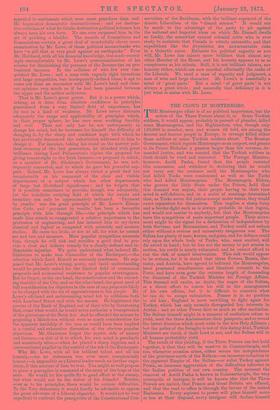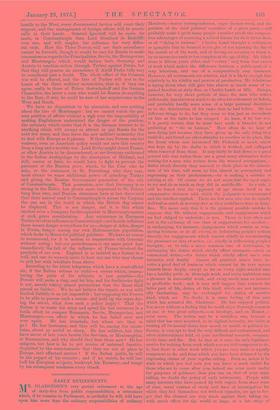THE CLOUD IN MONTENEGRO.
THE Montenegro affair is of no political importance, but the action of the Three Powers about it, is. Some Turkish soldiers, it would appear, probably in pursuit of plunder, killed some Montenegrins, and the Highlanders, who, though only 120,000 in number, men and women all told, are among the fiercest and bravest people in Europe, in revenge killed either those soldiers or some Turkish soldiers about. The Russian Government, which regards Montenegro as an outpost, and grants to its Prince Nicholas a pension larger than his revenue, de- manded justice, and was assured that the Turkish soldiers in fault should be tried and executed. The Foreign Minister, however, Aarifi Pasha, found that the people resented this concession, and withdrew it, declaring that he would not carry out the sentence until the Montenegrins who had killed Turks were condemned as well as the Turks who had killed Montenegrins. The Montenegrin Elders, who govern the little State under the Prince, held that this demand was unjust, their people having in their view acted in self-defence, and in a series of meetings determined that, as Turks never did justice except under terror, they would exact reparation for themselves. This implies a sharp foray and a border-fight such as is always probable in that region, and would not matter to anybody, but that the Montenegrins have the sympathies of more important people. Their move- ment might be the signal for a declaration of independence by both Servians and Roumanians, and Turkey could not reduce either without a serious and excessively dangerous war. The Sultan has plenty of men, horses, and guns, and for defence could rely upon the whole body of Turks, who, once excited, will die sword in hand ; but he has not the money to put armies in motion, his credit is nearly exhausted, and he cannot afford to run the risk of armed intervention. This risk would appear to be serious, for it is stated that three Powers, Russia, Ger- many, and Austria, have agreed to befriend the Montenegrins, have presented simultaneous and identical counsels to the Porte, and have even gone the extreme length of demanding the dismissal of the Turkish Minister for Foreign Affairs. This demand will excite, no doubt, the anger of the Sultan, as a direct effort to coerce his will in the management of his own affairs, but it is difficult to conceive what he can do to escape submission. France is in no position to aid him ; England is most unwilling to fight again for Turkey, which has only recently disregarded her interests in Arabia • and no other Power dare so much as offer mediation. The Sultan himself might in a moment of exaltation refuse to yield, send the three Ambassadors their passports, and so reveal the latent disunion which must exist in the new Holy Alliance ; but the policy of the Seraglio is not of this daring kind, Turkish Ministers are timid, if their Lord is not, and the Sultan will in all human probability yield. The result of this yielding, if the Three Powers can but hold together, is that they will be mastsrs in Constantinople, and can, whenever occasion arises, either secure the independence of the provinces north of the Balkan—an immense reduction in the apparent Empire of the Sultan—or enlist Turkey against Persia, an immense aggravation of the difficulties inherent in the Indian position of our own country. The moment the' removal of Aarifi Pasha is known in Constantinople, the very metropolis of intrigue, it will be known also that the Three Powers are united, that France and Great Britain are effaced, and that the road to office is through the favour of the united Embassies. Every aspirant to power will place himself more or less at 'their disposal, every intriguer will declare himself
hostile to the West, every discontented faction will court their support, and the management of foreign affairs will be practi- cally in their hands. General Ignatieff will be more, far more, in Constantinople than Lord Stratford de Redcliffe ever was, and will employ his influence for very differ- ent ends. How the Three Powers will use their ascendancy cannot be foretold, though it would be easy for Russia to make concessions as regards the Principalities, Servia, the Herzegovina, and Montenegro, which would induce both Germany and Austria to sanction action through Turkey against Persia, but that they will possess an ascendancy if Aarifi Pasha falls may be considered past a doubt. The whole effect of the Crimean war will be effaced, and the fate of Turkey will rest in the hands of the three military monarchies, that is, if they can agree, really in those of Prince Gortschakoff and the German Chancellor, the latter a man who would let Russia do anything in the East, if only he could be sure of her acquiescence in the West and South.
We have no disposition to be alarmists, and care nothing about the fate of Montenegro ; but we cannot watch the pre- sent position of affairs without a sigh over the impossibility of making Englishmen understand the danger of the position, the certainty which exists that it is the German interest to do anything which will occupy or attract or pay Russia for the next few years, and thus leave the new military monarchy free to deal with Europe as it pleases. If those two Powers can but coalesce, even an American policy would not save this country from a long and a terrible war. Lord Derby might desert France, or allow Austria to be dismembered, or see Germany enthroned in the Indian Archipelago by the absorption of Holland, and still, sooner or later, he would have to fight to prevent the payment of the Russian price, which, be the Czar who he may, or the statesmen at St. Petersburg who they may, must always be some additional power of attacking Turkey and giving the Russian Government possession of the city of Constantinople. That possession, now that Germany is so strong in the Baltic, has grown more important to St. Peters- burg than ever, and Russian statesmen have at last discovered that their nearest road to Constantinople is across the Caspian, the one sea in the world in which the British flag cannot be displayed. This is our danger, and it is this which renders even a trumpery border-squabble in Montenegro matter of such grave consideration. Any occurrence in European Turkey involves influence in Constantinople ; and hostile influence there means danger everywhere for us—danger at Aden, danger in Persia, danger among our own Mahommedan population, which looks to Mecca for political guidance. We have no course to recommend, for it is useless to remonstrate with Generals without acting ; but our powerlessness is one more proof how immediately the fall of the influence of France involved the paralysis of our own. England is as isolated as a lioness in a well, and can do scarcely more to hurt any one who may choose to pelt her with brickbats from above.
According to the latest telegrams, which have a semi-official air, if the Sultan refuses to yield—a course which, remem- bering the pride of his subjects, is just possible—the Powers will make a ring, and let him and his feudatories fight it out, merely taking armed precautions that the flame shall spread no further. We do not believe the report, as war with limited liability is as yet impossible ; but supposing the Powers to be able to pursue such a course, and hold up the ropes dur- ing the set-to, what does such a policy imply ? That the Sultan is to waste his army and spend his last resources in a futile effort to conquer Roumania, Servia, Herzegovina, and Montenegro,—an effort in which he has failed over and over again. He has ironclads, but where are they to go ? He has horsemen, and they will be, among the moun- tains, about as useful as sheep. He has soldiers, but they have never of late years beaten the Servians, or Montenegrins, or Roumanians, and why should they beat them now ? He has subjects, but how is he to put armies of untamed fanatics, dispirited by the consciousness that they are out of place in Europe, into effectual motion ? If the Sultan yields, he will be the puppet of his enemies ; and if he resists, he will lose half his European subjects, bankrupt his Treasury, and tempt by his subsequent weakness every attack.







































 Previous page
Previous page